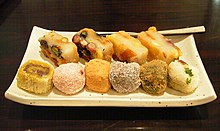떡: difference between revisions
Jump to navigation
Jump to search
Content deleted Content added
m 어깨-가 떡 |
|||
| Line 5: | Line 5: | ||
===Etymology 1=== |
===Etymology 1=== |
||
[[Image:Tteok.jpg|thumb|{{ko-l|떡||rice-dough cake}}.]] |
[[Image:Tteok.jpg|thumb|{{ko-l|떡||rice-dough cake}}.]] |
||
{{ko-etym-native|ws|ᄯᅥᆨ〮|sték}} |
{{ko-etym-native|ws|ᄯᅥᆨ〮|sték}} {{cog|ja|-}} {{ja-r|粢|しとぎ|sacrificial Shinto rice cake}} is an ancient Koreanic borrowing into Japanese. |
||
====Pronunciation==== |
====Pronunciation==== |
||
| Line 14: | Line 14: | ||
{{ko-noun}} |
{{ko-noun}} |
||
# [[rice cake]]; ''[[tteok]]'' |
|||
# [[tteok]], a type of Korean [[rice cake]] made with steamed flour, often sweetened |
|||
=====Derived terms===== |
=====Derived terms===== |
||
{{ |
{{der2|ko|떡가래|떡가루|떡갈비|떡고물|떡국|떡메|떡밥|떡방아|떡보|떡볶이|떡살|떡소|떡시루|떡쌀|떡판|가래떡|개떡|시루떡|쑥떡|찰떡|떡치다}} |
||
=====See also===== |
=====See also===== |
||
Revision as of 13:41, 4 September 2021
| ||||||||||
| 떠떡떢떣떤떥떦 떧떨떩떪떫떬떭 떮떯떰떱떲떳떴 떵떶떷떸떹떺떻 | |
| 떄 ← | → 떼 |
|---|---|
Korean
Etymology 1

First attested in the Worin seokbo (月印釋譜 / 월인석보), 1459, as Middle Korean ᄯᅥᆨ〮 (Yale: sték). Japanese 粢 (shitogi, “sacrificial Shinto rice cake”) is an ancient Koreanic borrowing into Japanese.
Pronunciation
- (SK Standard/Seoul) IPA(key): [t͈ʌ̹k̚]
- Phonetic hangul: [떡]
| Romanizations | |
|---|---|
| Revised Romanization? | tteok |
| Revised Romanization (translit.)? | tteog |
| McCune–Reischauer? | ttŏk |
| Yale Romanization? | ttek |
- South Gyeongsang (Busan) pitch accent: 떡의 / 떡에 / 떡까지
Syllables in red take high pitch. This word always takes high pitch and also heightens the next suffixed syllable, unless it is 에.
Noun
떡 • (tteok)
Derived terms
- 가래떡 (garaetteok)
- 개떡 (gaetteok)
- 떡가래 (tteokgarae)
- 떡가루 (tteokgaru)
- 떡갈비 (tteokgalbi)
- 떡고물 (tteokgomul)
- 떡국 (tteokguk)
- 떡메 (tteongme)
- 떡밥 (tteokbap)
- 떡방아 (tteokbang'a)
- 떡보 (tteokbo)
- 떡볶이 (tteokbokki)
- 떡살 (tteoksal)
- 떡소 (tteokso)
- 떡시루 (tteoksiru)
- 떡쌀 (tteokssal)
- 떡치다 (tteokchida)
- 떡판 (tteokpan)
- 시루떡 (sirutteok)
- 쑥떡 (ssuktteok)
- 찰떡 (chaltteok)
See also
Etymology 2
Of native Korean origin. Perhaps derived directly from 딱 (ttak).
Pronunciation
- (SK Standard/Seoul) IPA(key): [t͈ʌ̹k̚]
- Phonetic hangul: [떡]
| Romanizations | |
|---|---|
| Revised Romanization? | tteok |
| Revised Romanization (translit.)? | tteog |
| McCune–Reischauer? | ttŏk |
| Yale Romanization? | ttek |
Ideophone
| Yin-form | 떡 (tteok) |
|---|---|
| Yang-form | 딱 (ttak) |
떡 • (tteok)
- (of a gap, of a width) very widely, very broadly
- (of two things, also metaphoric) very tightly, in a perfectly fitting manner (often negative)
- while being immobile; (figurative) in an adult manner; intransigently (often negative)
Categories:
- Character boxes with compositions
- Hangul Syllables block
- Hangul script characters
- Korean terms inherited from Middle Korean
- Korean terms derived from Middle Korean
- Native Korean words
- Korean terms with IPA pronunciation
- Korean terms with dialectal pitch accent marked
- Korean lemmas
- Korean nouns
- Korean yin-vowel forms
- Korean ideophones
- Korean terms with usage examples
- ko:Foods